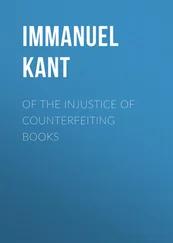And, indeed, how should it be possible, merely by the aid of the unity of consciousness — which we cognize only for the reason that it is indispensable to the possibility of experience — to pass the bounds of experience (our existence in this life); and to extend our cognition to the nature of all thinking beings by means of the empirical — but in relation to every sort of intuition, perfectly undetermined — proposition, “I think”?
There does not then exist any rational psychology as a doctrine furnishing any addition to our knowledge of ourselves. It is nothing more than a discipline, which sets impassable limits to speculative reason in this region of thought, to prevent it, on the one hand, from throwing itself into the arms of a soulless materialism, and, on the other, from losing itself in the mazes of a baseless spiritualism. It teaches us to consider this refusal of our reason to give any satisfactory answer to questions which reach beyond the limits of this our human life, as a hint to abandon fruitless speculation; and to direct, to a practical use, our knowledge of ourselves — which, although applicable only to objects of experience, receives its principles from a higher source, and regulates its procedure as if our destiny reached far beyond the boundaries of experience and life.
From all this it is evident that rational psychology has its origin in a mere misunderstanding. The unity of consciousness, which lies at the basis of the categories, is considered to be an intuition of the subject as an object; and the category of substance is applied to the intuition. But this unity is nothing more than the unity in thought, by which no object is given; to which therefore the category of substance — which always presupposes a given intuition — cannot be applied. Consequently, the subject cannot be cognized. The subject of the categories cannot, therefore, for the very reason that it cogitates these, frame any conception of itself as an object of the categories; for, to cogitate these, it must lay at the foundation its own pure self-consciousness — the very thing that it wishes to explain and describe. In like manner, the subject, in which the representation of time has its basis, cannot determine, for this very reason, its own existence in time. Now, if the latter is impossible, the former, as an attempt to determine itself by means of the categories as a thinking being in general, is no less so. 47
Thus, then, appears the vanity of the hope of establishing a cognition which is to extend its rule beyond the limits of experience — a cognition which is one of the highest interests of humanity; and thus is proved the futility of the attempt of speculative philosophy in this region of thought. But, in this interest of thought, the severity of criticism has rendered to reason a not unimportant service, by the demonstration of the impossibility of making any dogmatical affirmation concerning an object of experience beyond the boundaries of experience. She has thus fortified reason against all affirmations of the contrary. Now, this can be accomplished in only two ways. Either our proposition must be proved apodeictically; or, if this is unsuccessful, the sources of this inability must be sought for, and, if these are discovered to exist in the natural and necessary limitation of our reason, our opponents must submit to the same law of renunciation and refrain from advancing claims to dogmatic assertion.
But the right, say rather the necessity to admit a future life, upon principles of the practical conjoined with the speculative use of reason, has lost nothing by this renunciation; for the merely speculative proof has never had any influence upon the common reason of men. It stands upon the point of a hair, so that even the schools have been able to preserve it from falling only by incessantly discussing it and spinning it like a top; and even in their eyes it has never been able to present any safe foundation for the erection of a theory. The proofs which have been current among men, preserve their value undiminished; nay, rather gain in clearness and unsophisticated power, by the rejection of the dogmatical assumptions of speculative reason. For reason is thus confined within her own peculiar province — the arrangement of ends or aims, which is at the same time the arrangement of nature; and, as a practical faculty, without limiting itself to the latter, it is justified in extending the former, and with it our own existence, beyond the boundaries of experience and life. If we turn our attention to the analogy of the nature of living beings in this world, in the consideration of which reason is obliged to accept as a principle that no organ, no faculty, no appetite is useless, and that nothing is superfluous, nothing disproportionate to its use, nothing unsuited to its end; but that, on the contrary, everything is perfectly conformed to its destination in life — we shall find that man, who alone is the final end and aim of this order, is still the only animal that seems to be excepted from it. For his natural gifts — not merely as regards the talents and motives that may incite him to employ them, but especially the moral law in him — stretch so far beyond all mere earthly utility and advantage, that he feels himself bound to prize the mere consciousness of probity, apart from all advantageous consequences — even the shadowy gift of posthumous fame — above everything; and he is conscious of an inward call to constitute himself, by his conduct in this world — without regard to mere sublunary interests — the citizen of a better. This mighty, irresistible proof — accompanied by an ever-increasing knowledge of the conformability to a purpose in everything we see around us, by the conviction of the boundless immensity of creation, by the consciousness of a certain illimitableness in the possible extension of our knowledge, and by a desire commensurate therewith — remains to humanity, even after the theoretical cognition of ourselves has failed to establish the necessity of an existence after death.
Conclusion of the Solution of the Psychological Paralogism.
The dialectical illusion in rational psychology arises from our confounding an idea of reason (of a pure intelligence) with the conception — in every respect undetermined — of a thinking being in general. I cogitate myself in behalf of a possible experience, at the same time making abstraction of all actual experience; and infer therefrom that I can be conscious of myself apart from experience and its empirical conditions. I consequently confound the possible abstraction of my empirically determined existence with the supposed consciousness of a possible separate existence of my thinking self; and I believe that I cognize what is substantial in myself as a transcendental subject, when I have nothing more in thought than the unity of consciousness, which lies at the basis of all determination of cognition.
The task of explaining the community of the soul with the body does not properly belong to the psychology of which we are here speaking; because it proposes to prove the personality of the soul apart from this communion (after death), and is therefore transcendent in the proper sense of the word, although occupying itself with an object of experience — only in so far, however, as it ceases to be an object of experience. But a sufficient answer may be found to the question in our system. The difficulty which lies in the execution of this task consists, as is well known, in the presupposed heterogeneity of the object of the internal sense (the soul) and the objects of the external senses; inasmuch as the formal condition of the intuition of the one is time, and of that of the other space also. But if we consider that both kinds of objects do not differ internally, but only in so far as the one appears externally to the other — consequently, that what lies at the basis of phenomena, as a thing in itself, may not be heterogeneous; this difficulty disappears. There then remains no other difficulty than is to be found in the question — how a community of substances is possible; a question which lies out of the region of psychology, and which the reader, after what in our analytic has been said of primitive forces and faculties, will easily judge to be also beyond the region of human cognition.
Читать дальше












